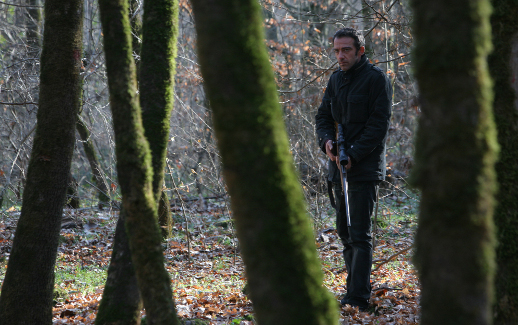This Festival Goes to Eleven
If we look carefully, international film festivals can be read as cultural barometers, with recent trends in cinema echoing broader shifts in the world system of image production. For the Japanese film industry, the most conspicuous change in the past decade has been that films of Western origin are being steadily displaced by Asian productions. While this change is almost imperceptible on the multiplex marquee, it is clearer in festival programs, especially one such as FILMeX that gives pride of place to Asian directors.
This year’s edition includes four sections, spanning Asia and world cinema, past and present. Often drawing upon the international festival circuit, the films in the main competition and “Special Screenings” sections have their Japanese premiere at FILMeX. The third section, “Amos Gitai: The Spirit of Exile”, is a retrospective co-presented with L’Institut Franco-Japonais de Tokyo, and L’Athénée Français Cultural Center. Finally, a special program on the Japanese cinema of the Golden Age includes a series of Shochiku productions from the 1950s.
The festival opens with Apichatpong Weerasethakul’s “Uncle Boonmee Who Can Recall His Past Lives”, a highly imaginative story of a middle-aged man who returns home to rural Thailand, expecting to meet the end of his life. A surprise winner of the Palm d’or at Cannes, “Uncle Boonmee” has both mesmerized and polarized critics across Europe and North America.

The main competition, comprised of ten films, is focused on emerging Asian directors. Iranian filmmaker Rafi Pitts’ “The Hunter” follows a man on a mission of vengeance, after his wife is killed by police gunfire at an election demonstration. The Kim Brothers’ bizarro “Anti Gas Skin” looks at contemporary Korean society through the goggles of a gas-mask-clad serial killer. From Hong Kong, Dante Lam’s “The Stool Pigeon” reunites the production team of “Beast Stalker” to unspool a taut genre thriller about low-ranking criminals recruited as police informants. On a quieter note, Malaysian director Tan Chui Mui’s languid “Year Without a Summer” explores an estranged friendship between two young men in a fishing village, suddenly rekindled when one of them reappears home after years of absence. Themes of lost friendship and rural homecoming are also treated in Jang Cheol-Soo’s début picture “Bedeviled” (winner of Best Film at the Puchon Fantastic Festival). From Taiwan, Chang Tso-Chi’s comic melodrama “When Love Comes” is the story of a family-run restaurant outside of Taipei, in which the woman control the men.
The main competition also includes two new works from Japan. Nobuteru Uchida’s “Love Addiction” is a complex, romantic drama of four men and women working in the same office. Following “Campaign” and “Mental”, director Kazuhiro Soda returns with a new observational documentary entitled “Peace”. This time, Soda treats themes of social welfare through the lives of an aging couple working as care attendants.
Unlike the Tokyo International Film Festival (TIFF), FILMeX has consistently included a special section that exposes important and lesser-known works from Japanese film history. In 2009, this was “Nippon Modern: 1930s”, representing works by the directors of the Shochiku Kamata studio. For this year, Shochiku directors are again the focus, with “Golden Classics 1950s”: 14 films by Minoru Shibuya, Keisuke Kinoshita, and Yasujiro Ozu. Kinoshita’s two Carmen comedies and Ozu’s Noriko Trilogy are of course widely known, but Shibuya’s films are not. Following the end of the festival, a second installment of this program will also screen at the Togeki theater (although many without English subtitles). While this two-part program is a very generous helping of postwar film from Shochiku, it appears significantly less curated than some of the previous retrospectives at FILMeX.

Notable films in the “Special Screenings” program include “I Wish I Knew”, Jia Zhang-ke’s documentary love letter to the city of Shanghai, Korean director Chang-dong Lee’s “Poetry” (Lee is also known for “Oasis” and “Secret Sunshine”), the story of a sensitive grandmother’s attempts to grapple with the shocks of the present, and Abbas Kiarostami’s “Certified Copy”, a love-travel drama set in Tuscany (and for which Juliette Binoche won Best Actress at Cannes).
Following his much-praised “Love Exposure”, Sion Sono’s new “Cold Fish” promises to satisfy as well. Inspired by a fait divers, “Cold Fish” tells the story of Shamoto, the downtrodden owner of a tropical fish shop who is drawn into a wave of brutal murders. With its speedy pace and gory excess, this film represents a total departure from Sono’s previous work. Another director who screened at the 2008 FILMeX, Ryusuke Hamaguchi returns this year with “The Depths”, a Japanese-Korean co-production. “The Depths” is the story of a photographer’s obsession with one of his subjects.
The Special Screenings program also includes four short “Kaidan — Horror Classics”, which are in fact new films by contemporary directors: Masayuki Ochiai (“The Arm”), Shinya Tsukamoto (“The Whistler”), Sang-il Lee (“The Nose”), and Hirokazu Kore-eda (“The Days After”). Co-produced with NHK and ranging from thirty to fifty minutes, these are based on literary adaptations of fantastic tales by Kawabata, Dazai, Akutagawa, and Muro.
Now in its eleventh year, FILMeX has risen to become one of the principle festivals for Tokyo cinéphiles. With the ongoing failure of the Tokyo International Film Festival to provide a vision for the future of cinema (beyond winter-season industry publicity, that is), it is more important than ever to look to festival programs that explore alternative production values in a different ecosystem of the image. FILMeX points to one such direction.
Tokyo FILMeX 2010 runs November 20 to 28 at Yurakucho Asahi Hall. Advance reservations highly recommended. See the festival homepage for more information.
M. Downing Roberts
M. Downing Roberts



